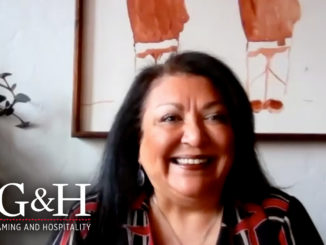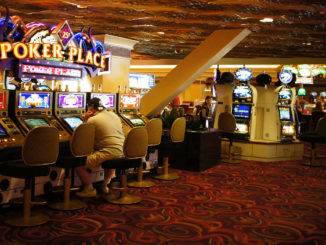
Sponsored Content
 By Andrada Paraschiv, Head of Hospitality, Beekeeper
By Andrada Paraschiv, Head of Hospitality, Beekeeper
The hospitality industry has a lot to look forward to in 2021, with 1.8 million vaccinations administered in the U.S. each day and travel demand poised to boil over with 82 percent of American families already making travel plans for 2021. When COVID-19 struck, Tribal hotels and casinos began realizing that they didn’t have proper processes in place to effectively communicate procedural changes and reopening plans with furloughed frontline workers, as these team members do not have a company email address.
One of the greatest trends facing Tribal gaming and hospitality operators lies at the intersection of technology and the human element. To survive today, employers must operate with fewer team members. A reduced team requires a nimbler workforce. To become nimble, management must adopt digital tools to improve communication and accountability.
Tribal casino and hotel operators have long needed more sophisticated, efficient ways to manage team members and give them greater agency at the property level. As many spent 2020 transitioning workers in and out of furlough, this issue took center stage. Social distancing requirements also meant changing the rules for sharing information between team members on and off-property.
To remain hospitable to guests and team members, operators must embrace new forms of digital communication and information delivery.
Shifting Communication
One result of the pandemic was a push within hospitality to adopt digital communications tools that were once aspirational, but now have become necessities. For example, many hotels across the industry continue to post paper shift schedules throughout the property as the primary method of communicating shift information to team members. This traditional way of getting information to workers may be second nature to employers, but today it creates a tangled web of complications whenever a change in schedule occurs.
Such was the situation at a Tribal casino in New Mexico, which adopted Beekeeper’s operational communication platform in early 2020. The property briefly shut down at the onset of COVID-19, but when it reopened in October last year, team members were able to access a fully digitized platform designed to clearly provide shift information to all workers, at any time.
 Beekeeper’s operational suite enabled the Tribal casino to digitize team member-facing forms and ensure shift schedules were instantly updated and readily available on team member devices. The digitization also spared the hotel’s managers from having to print six-page schedule documents, a task they typically spent three to four hours a week on as schedule updates became necessary. As a result, the hotel – and the environment – benefited from an estimated $80,000 yearly cost reduction in color printouts alone.
Beekeeper’s operational suite enabled the Tribal casino to digitize team member-facing forms and ensure shift schedules were instantly updated and readily available on team member devices. The digitization also spared the hotel’s managers from having to print six-page schedule documents, a task they typically spent three to four hours a week on as schedule updates became necessary. As a result, the hotel – and the environment – benefited from an estimated $80,000 yearly cost reduction in color printouts alone.
Communication comes naturally to hoteliers, which is why it is time to lend that affinity to the back-of-house and provide as much information to frontline team members as possible. With fewer workers assuming more tasks and responsibilities, they rely on the information given to them to succeed. Digitization of the workforce is a major step towards reducing confusion on-property and strengthening team member decision making.
Now, when operations are disrupted the most, is the time to open the causeways of communication between different departments and provide all team members with up-to-date operational information.
No More Surprises
Digital communications technology may be effective for reducing friction in hotel operations, but it is also crucial for promoting safety and security on-property. Feather Falls Casino, Lodge & Brewing Company in Oroville, CA, partnered with Beekeeper to provide digital communications tools to its team members following a period of historic heavy rainfall in 2017. More than 180,000 people in Oroville were evacuated amidst fear that the Oroville Dam would be breached.
At that time, Feather Falls had no way to stay in contact with some of its 520 team members who had been evacuated. Today, the property’s team members can be easily reached using two-way communication over Beekeeper’s smartphone app. The need for this instant interaction has become even more important in the wake of COVID-19, where both guest and team member communication continues to take place over digital channels. This form of interaction also levels the playing field for all team members, allowing workers without access to computers or email during their shift to be engaged with the property.
Connecting Is Key
Engagement is another key component of operating today. According to the Pew Research Center, team members are working longer hours across the board, and the shadow of burnout continues to persist in hospitality. In this environment, characterized by fewer people on-property, limited opportunities to directly communicate with workers and greater individual accountability, hotel team members need to be recognized and their successes must be acknowledged.
With so many unknowns in everyday life, team members are also appreciative of any steps toward transparency and inclusivity, regardless of their shift or department. Now, more than ever, Tribal casino and hotel workers want to know they are being heard, and communications technology is making this more possible.
Improving Amidst Chaos
Just like everyone else, the hotel industry was unable to see the oncoming communications fallout that would follow the onset of COVID-19. Many properties resisted the investment of new digital communications tools for many reasons, including concerns that the onboarding and training period for team members would disrupt operations unnecessarily. But if necessary, how can a hospitality business hope to roll out a sophisticated digital communications platform across a large property during such a tumultuous period?
In March of 2020, Morongo Casino Resort & Spa in Cabazon, CA, was facing a crisis. The hotel was choosing to voluntarily close its doors as news of the pandemic continued to grow in scope. Among its many challenges, the hotel was faced with the need to maintain communication with its 1,850 team members, many of whom lacked access to a company email address.
By December, more than 92 percent of the company’s team members were communicating using Beekeeper’s mobile app, allowing the hotel to retain engagement with team members as the hotel’s status evolved. Morongo was able to introduce communications technology to its sprawling list of team members during the most unpredictable economic crisis in decades. The property was able to do so thanks to the simplicity of the technology and the need to improve communications.
Face-to-face interaction will always be the cornerstone of hospitality, but the pandemic has shown us that this is the ideal situation, not always a realistic or convenient one. Digital communication complements face-to-face communication, especially when it comes to bringing together cross-functional teams, or teams that may not be at the same place at the same time. This goes beyond COVID-19, as communication challenges have preceded the pandemic and have only been accentuated in the past year.
The perceived challenge in improving communications often lies in the scope of the project. But once every team member is joined on one platform, all sharing information, hotels will find that even a large property is not that big after all.




